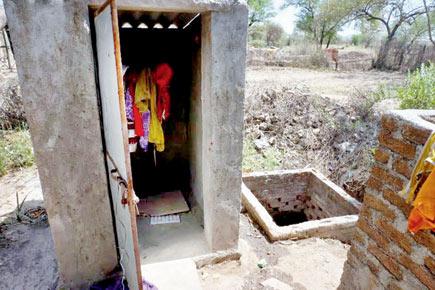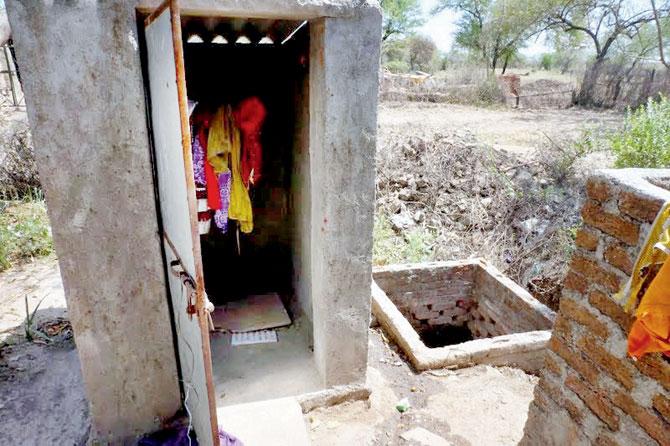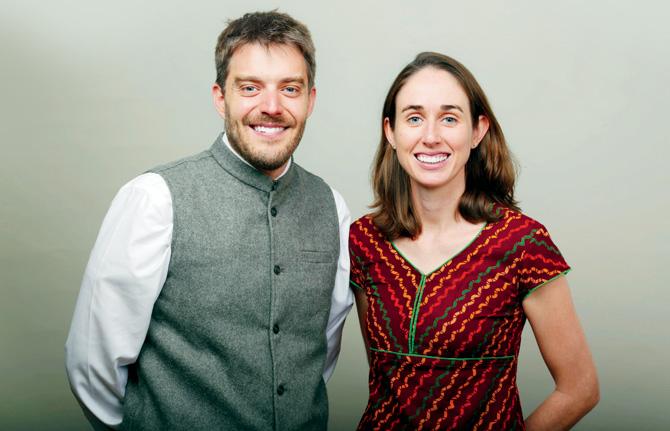A new book by two American researchers looks at the open defecation menace, and the reason nobody is talking about it

Dean Spears and Diane Coffey

A government constructed latrine in rural India
In 2011 Dean Spears, originally from Tulsa, Oklahoma, left America to make India his home. Intriguingly, he chose Sitapur, a district in Uttar Pradesh, as his base. By then, his wife Diane Coffey, a professor and co-executive director of r.i.c.e., Research Institute for Compassionate Economics, was already working as a researcher in the country. "Both of us are demographers and have been studying children's health and human capital, which often means height, sanitation and social forces in Indian households and villages. So, to understand the problem first hand it was important for us to be in the heart of it," he says. The couple were particularly keen on looking at the problem of open defecation in rural India.
"We realised that rural India's exceptionally high rate of open defecation has much less to do with poverty than social forces," he says. Years of research has been condensed in a book titled Where India Goes: Abandoned Toilets, Stunted Development and the Costs of Caste! The book focuses on an oft-ignored aspect of Indian life; open defecation, especially in high density pockets, and its domino effect on infant mortality, stunting and women's health in India.

Dean Spears and Diane Coffey
Rooted in reality
Having lived here for over seven years, the couple, has blended fairly well with Indian ways, as is evident when Spears breaks into fluent Hindi during the telephonic interview. In fact, it's this hold over the language that's helped ensure that nothing got lost in translation. "We realised that a lot of what was written on poverty and health was bottled up in academic research papers. Why were so many children dying or had stunted growth? It is something that should be of concern to everybody," he says. He felt it was a question that ought to be addressed in the mainstream. "We wanted to tell the story in a way that initiated dialogue," he says.
Open defecation, according to him, presents a puzzle. "India has far higher open defecation rates than neighbouring countries like Nepal or Bangladesh where people are poorer, literacy rates are lower and water is more scarce. Because open defecation has terrible consequences for health, it is important to understand why few villagers use latrines," he says. The problem lies in casteism and the issue of who will empty the latrines. "Upper caste members are very uncomfortable emptying their own toilets, Dalits refuse to do so because it's a marker of oppression," he says. Spears says he was shocked to witness people walking past well constructed latrines to defecate in the open. What was also surprising was the fact that they had no qualms discussing the matter. "A lot of urban people assume that people in rural India will be uncomfortable talking about open defecation. But what we found that everybody around them defecates in the open. It's not shameful, it's normal. They are perfectly happy to talk about it," he says.
While the Swachh Bharat Abhiyan campaign may be slowly gaining momentum in urban areas, it's impact is yet to be felt in rural areas. Most people, he says, had heard about it but consider it an exhortation to pick a broom and clean. "What the Indian government has been doing for a long time is basically building latrines for people, but there's no alacrity on part of people to use them," he says.
The book, however, doesn't offer solutions. "It's not an easy problem to fix. Nobody wants to talk about it because it's uncomfortable. The first step is essentially understanding how hard it is because you're working against social forces that have been around for a long time now." Spears, through the book, hopes to get people to start with acknowledging that there is a problem, and take it ahead from there.
 Subscribe today by clicking the link and stay updated with the latest news!" Click here!
Subscribe today by clicking the link and stay updated with the latest news!" Click here!







